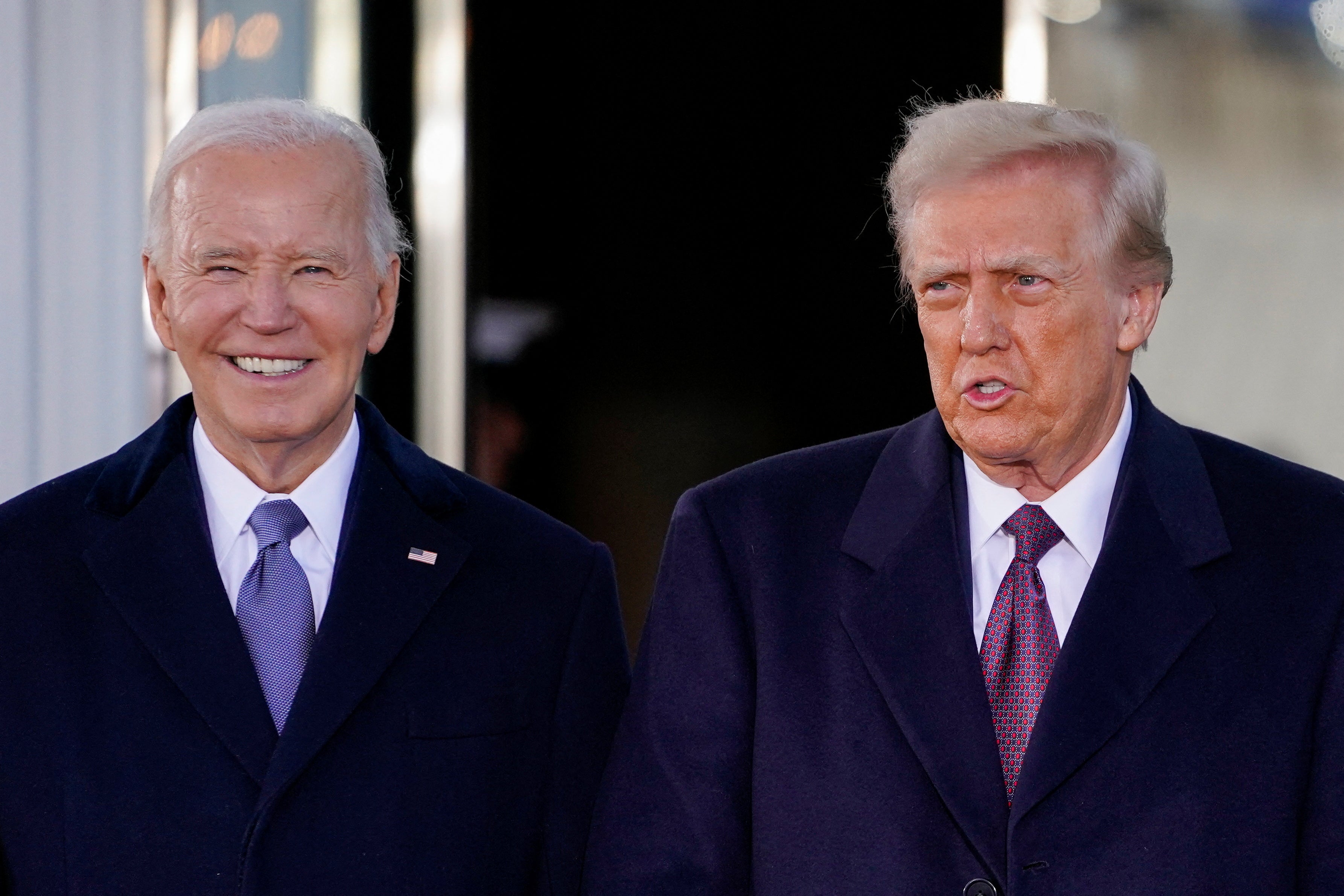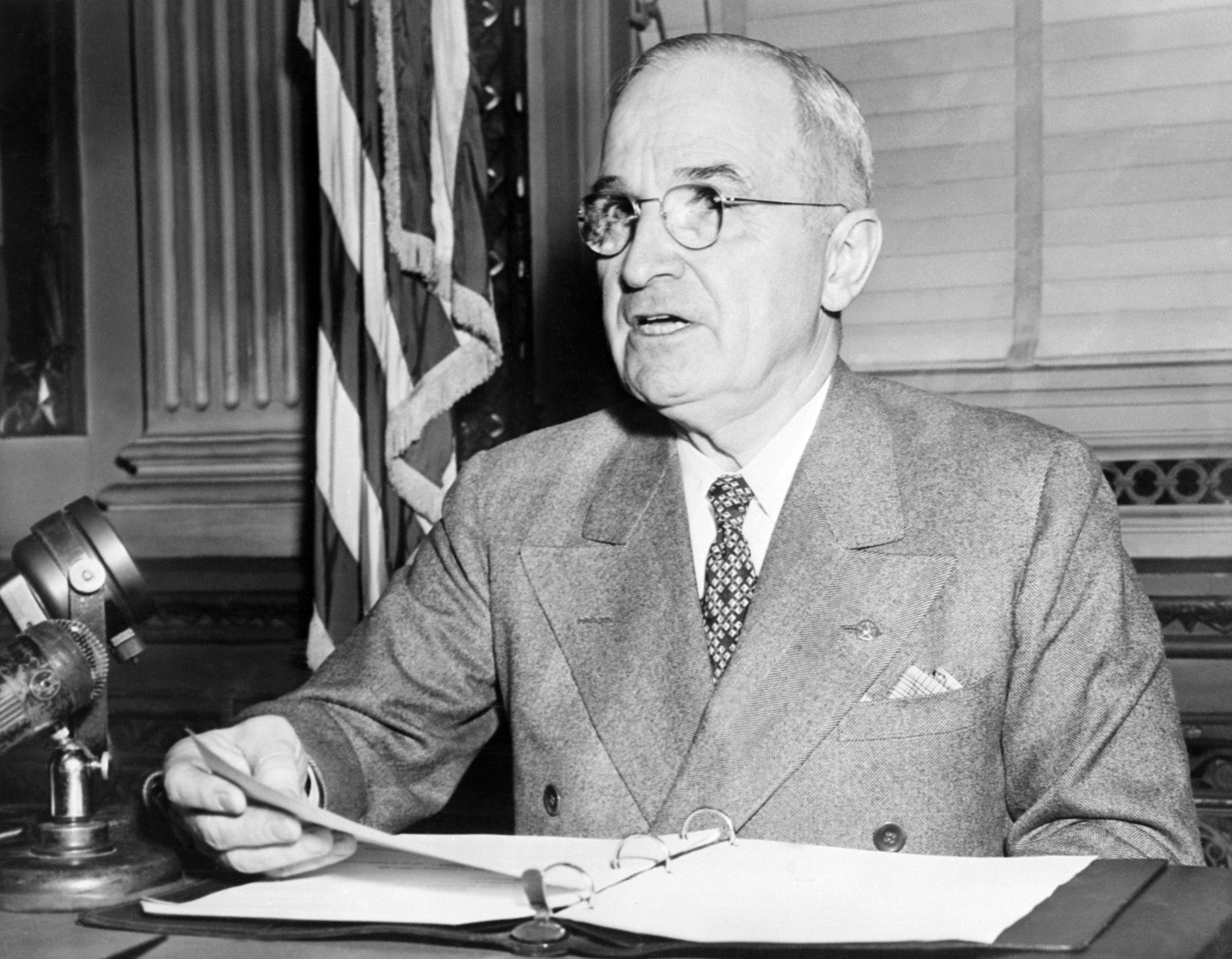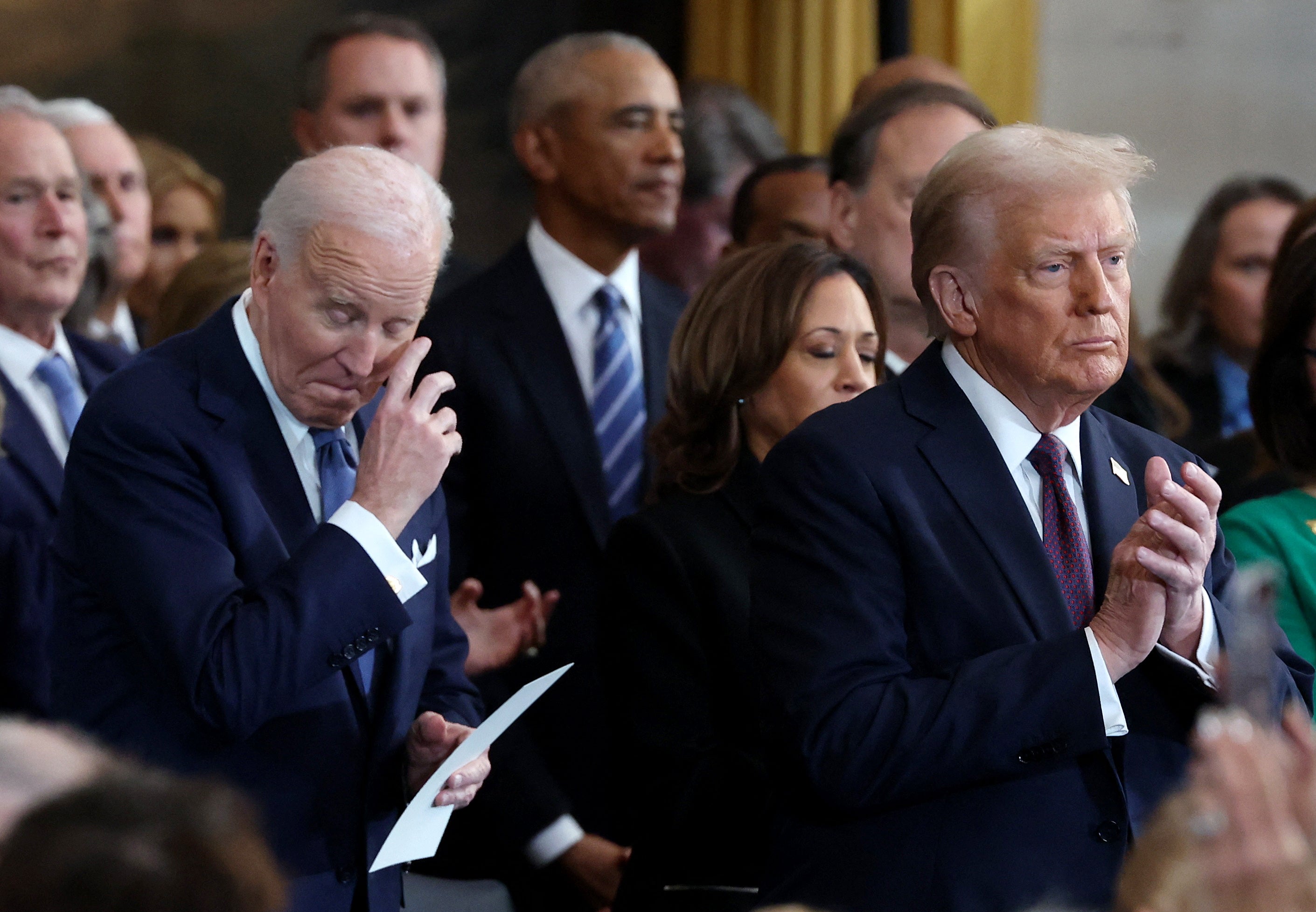When Harry Truman served as president starting nearly 80 years ago, he famously had a sign on his desk which read: “The Buck Stops Here.”
But if Donald Trump were to commission a similar ornament for the iconic desk hewed from timbers salvaged from HMS Resolute, it would probably say something like: “That was Biden’s fault.”
Since taking office in January, Trump has made a constant habit of invoking his predecessor’s name at almost every public appearance he makes, either to blame the 46th president for whatever ills he is purporting to address with his latest executive actions, or to deflect from bad news while absorbing all the credit for anything positive that has happened recently.
He laid this out in bare terms on Friday when he sat for an interview with NBC News anchor Kristen Welker on Meet the Press. Pressed on his habit of bashing Biden for economic problems even though he routinely claims credit for a “Trump effect” on the economy, Trump said he would only associate himself with “certain aspects” of it.
“I think the good parts are the Trump economy and the bad parts are the Biden economy because he’s done a terrible job,” he said.
Days later, he turned a question on whether his sit-down with Canadian Prime Minister Mark Carney could be made more difficult by the prime minister’s declaration that his country was “not for sale” into another opportunity to bash Biden.

Trump began to answer in the negative and talk about how much the United States and Canada “love each other.” But it wasn’t long until a tangent about China’s trade surplus with the U.S. turned into a rant about his predecessor.
“When I started, I say we were losing billions of dollars a day on trade that's rapidly turning around. We looked at numbers this morning. So we were losing the United States, during Biden, was losing more than – I won't even give you numbers because they're so embarrassing, but billions of dollars a day on trade,” he said.
Trump then claimed the massive import taxes he was imposing on American importers are “rapidly” turning around America’s trade deficits. But he couldn’t help but bring up his predecessor’s name. Again.
“The biggest investment ever made in the United States is being made right now, trillions of dollars. I would say we could be at nine. $9 trillion you could go back to other presidents. They haven't had $1 trillion for their entire term. Look at Biden. He had bad numbers. People leaving. They weren't coming in. They were leaving with Biden, and he didn't know the difference. The only thing he knew is people coming in,,” he said.
“You know who they were, illegal immigrants, okay, from prisons, from mental institutions, from all sorts of places that weren't good, from gangs from Venezuela. They were coming in, and they were criminals and murderers. 11,888 people that murdered, and at least half of them murdered more than one person. This is what Biden let into our country.”
Trump’s riffing about Biden during the Tuesday bilateral wasn’t the first time he’d invoked the man who defeated him in the 2020 election this week. He’d mentioned him twice during an Oval Office media availability to announce that Washington, D.C. would host the NFL draft in two years.
And the day before, when Trump was taking questions from a group of reporters aboard Air Force One while returning to Washington from his Palm Beach, Florida home, he’d couldn’t help but do it again.
As he entered the cramped press cabin aboard the converted Boeing 757 he’d used for the past weekend’s travel, he launched into a soliloquy about how there was “a lot of good news” coming this week. Specifically, he said there would be “good things coming out of the many war zones that were created by Biden and a group of incompetent people.”
But not wanting to elaborate further after insulting his predecessor once more, he added: “We’ll talk about that later or tomorrow.”
Since taking office for a second non-consecutive term that has no precedent in modern history, President Donald Trump has often remarked that no other presidents have done what he has done.
In one specific area — his near-obsessive invocation of his predecessor’s name — he is absolutely, objectively correct.
Trump is an outlier among modern American chief executives in that he has steadfastly refused to let go of his predecessors as targets for political attacks or scapegoats for anything that goes wrong on his watch.
That’s because the American political tradition, for better or worse, has always been to move forward and not obsess over blame for whatever came in the past.
When a president is inaugurated after knocking off an incumbent administration or after flipping control of the White House from the opposing political party, it’s often because voters were dissatisfied with his predecessor in some major way.
In 1981, Ronald Reagan came into office with a mandate based on voters’ rejection of the Carter administration’s handling of inflation and high-profile foreign policy blunders. He did not spend his historic first 100 days carping about how bad his predecessor had been.
When Bill Clinton defeated George HW Bush in the 1992 presidential election, it was on the strength of Clinton’s ability to convince voters that he understood the economic pain they were feeling as the country went through a recession that took the wind out of Bush’s political sails in the wake of the first Gulf War. But Clinton hardly mentioned Bush during his first months in office.
Bush’s father, George W. Bush, entered office with a mandate to restore trust in the presidency after Bill Clinton’s marital infidelity — and his related perjury in the face of a special prosecutor’s investigation — led to him being the first American president to face impeachment in more than a century. But Clinton wasn’t much of a foil for Bush, who got to work on a host of conservative priorities until the September 11, 2001 terror attacks upended his presidency.
And the younger Bush’s successor, Barack Obama, was swept into the presidency on the heels of a generational financial crisis and widespread discontent over the way Bush had prosecuted two wars, including the invasion of Iraq on false pretenses.

Each of those presidents earned their place in the White House on the backs of failures by their predecessors, yet to a man they chose to move forward and push their own agenda based on their own electoral mandates, rather than prosecute claims against those who’d come before.
Not so with Trump.
Over his first 100 days, NBC News reported that he invoked Biden’s name an average of more than six times a day, every day since January 20, the day he was sworn in.
Trump brought up Biden 12 times on the day he took office — a marked contrast to the man he’d replaced, who during his first few years in office scarcely uttered Trump’s name — plus 16 times during his record-length address to a joint session of Congress in March. During his most recent cabinet meeting on Thursday, he and his top aides invoked the Democrat’s name nearly 50 times over the course of two hours, including a question and answer session with reporters.
It was just hours after the Bureau of Economic Analysis published statistics showing that the first quarter of year — mostly during Trump’s presidency — had resulted in the economy contracting for the first time in years.
Though he routinely took credit for economic highs during the latter years of the Biden presidency when he was running against him, Trump blamed Biden for his own bad numbers. When The Independent pressed him on why, he went so far as to suggest he’d blame Biden if the next three months were equally bad.

He replied that he was “not taking credit or discredit for the stock market.”
“I’m just saying that we inherited a mess,” he said. “You could look at every single one of the people here and no matter who it is, they’re doing better and they are far superior to what took place for four years before.”
Trump continued riffing on that theme during a pair of incongruous appearances on Thursday — a National Day of Prayer event in the Rose Garden and a commencement address at the University of Alabama in Tuscaloosa, Alabama.
He mentioned Biden during both, using his name at times like an epithet and blaming him for the poor state of things.
Andrew Bates, a former principal deputy press secretary in the Biden White House, told The Independent via text message that Trump’s inability to keep the former president’s name out of his mouth was a telling sign of insecurity about how he has handled the economy Biden left him.
“Joe Biden handed Donald Trump an economy that was out-matching all our rivals; experts called it 'the envy of the world.' In 100 days, Trump sent that economy into an unprecedented tailspin with tariffs that are the biggest middle class tax increase in modern history — tariffs Joe Biden publicly warned against. Trump's about to worsen that self-inflicted damage with inflationary tax giveaways for the rich. Meanwhile, he's exploiting his private clubs to profit off the presidency,” he said.
“It makes sense that the name of a President with a better economic record is on Trump's mind, but I'm surprised he wants Americans thinking about how much better off they were before the Trump Crime Family was in charge."
Trump may want Americans to blame Biden for any negative results from his own policies, but it doesn’t look like voters are interested for the most part.
Nearly half of voters surveyed in April by Gallup in a recent poll believe that Trump is more responsible for the unstable economy than Biden, up three percent from the previous month.
Larry Sabato, the director of the University of Virginia Center for Politics, told The Independent that Trump’s deflections are only working on those who are going to believe him no matter what because his MAGA base won’t ever tire of blaming Biden.
“Cult members always listen approvingly to the cult leader. As for everyone else, the Biden blame game is already stale. Yes, Biden is as unpopular as ever, but every person knows from their own experience that you have to accept some responsibility for what happens on your watch,” he said.
Sabato added that Trump has “overdone” the Biden attacks, leading Americans to tune them out.
“If there’s a recession, Katie bar the door. It will be the Trump Recession, and there’s no escaping his personal responsibility,” he said.







